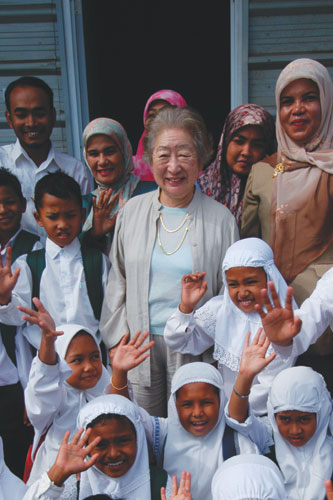Japan's Official Development Assistance White Paper 2005
Column I-1 Human Security and New Approaches for Poverty Reduction - Sadako Ogata, President of the Japan International Cooperation Agency ( JICA )

Sadako Ogata with children at the tsunami site, where JICA provided assistance in collaboration with the NGOs (Photo: JICA)
We live in a globalizing world where massive amounts of people, goods, money, and information move fast across borders. This has brought about many challenges, such as infectious diseases, large-scale natural disasters, and environmental degradation. These pose major threats to people's survival and are difficult for a single government or nation to resolve.
"Human security," a concept and a framework developed in the face of such circumstances, is one of the basic policies of the New ODA Charter. Human security focuses on people and communities, particularly on the poor and the vulnerable. The core value of this framework lies in linking both the top-down approach, which seeks to improve the capacity of governments to protect and expand the rights and freedoms of their people, and the bottom-up approach, which aims at strengthening the capabilities of people and communities to take the lead in development.
There is a tendency for governments and international organizations to carry out their activities individually, in a sectionalized manner. In order to realize human security this tendency must be overcome, however. Programs and projects must be carried out in a comprehensive, cross-sectoral, and flexible manner.
At JICA, where I serve as president, we have been reexamining our operations and working to reform the minds of our staff and our systems to place priority on reaching and benefiting people as we support self-help efforts in areas including community and rural development.
The major earthquake off the coast of Sumatra and the tsunami in the Indian Ocean, which occurred in December 2004 and killed over 300,000 people, caused massive damage on such an unprecedented scale that it shocked the entire world. In response, the international community has extended a helping hand. JICA promptly dispatched Japan Disaster Relief Teams ( JDRTs ) to the affected countries and carried out JICA's largest-scale rescue operations to date. We have since been providing rehabilitation and reconstruction assistance.
Meanwhile, Africa faces a grave situation. Infectious diseases like malaria and HIV/AIDS, the so-called "quiet tsunami," are threatening the lives and livelihoods of Africans by killing 6,000 children every day, and wide-ranging measures to tackle poverty are needed. Africa is the region with the largest number of least developed countries ( LDCs ), and the enhancement of aid to the region was emphasized at the Gleneagles Summit, which took place this year in the United Kingdom. In recent years JICA had allotted approximately 15% of its overall project budget to Africa. In 2004, however, we established a new department in charge of Africa, and we are moving to enhance our field operations there. In line with this we are increasing this allotment to over 20%.
The effectiveness of Japan's cooperation is apparent when we travel in Africa and visit the medical research institute for infectious diseases and hospitals in Kenya or the vocational training center in Senegal, or when we observe the science and mathematics education that we are disseminating throughout the African continent. If we consider these successes to be "islands of hope" in Africa, then the way to reduce poverty through the human security framework is to develop these islands into a "continent."
In Asia, where Japan's cooperation has been most effective, JICA's human resources development and infrastructure development have served as two wheels of a vehicle, producing a synergic effect. In Africa, while we work to reach and benefit the people, developing infrastructure, such as transportation networks that run beyond national borders, and providing assistance that aims at enhancing the capabilities of governments and people, are also important issues to be addressed in the future as part of the fight against poverty.
As international environments undergo constant change, we intend to respond to the changes in a flexible and prompt manner. We at JICA will continue utilizing our knowledge and ingenuity to tackle the great challenge of reducing poverty.

 Next Page
Next Page